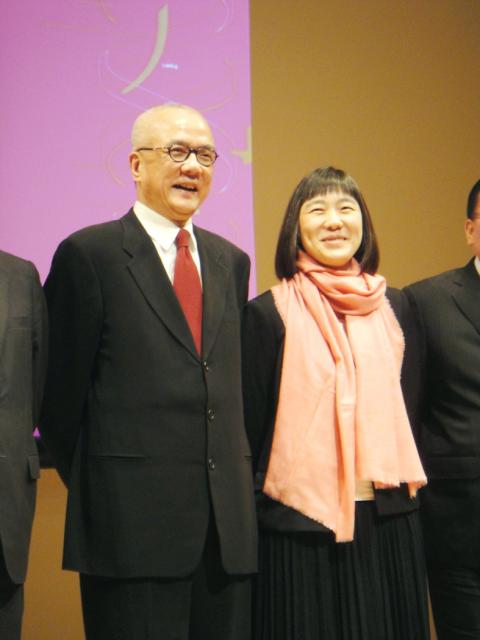Eslite Group (誠品集團) aims to increase group revenue by between 10 percent and 15 percent over the next five years on the back of planned expansion in Taiwan, China and Hong Kong, chairman Robert Wu (吳清友) said yesterday.
The group, which runs bookstores, galleries and department stores, reported a consolidated revenue of NT$13 billion (US$427.98 million) for last year.
Sales for this year could break the NT$14 billion mark, Wu told a media briefing in Taipei after celebrating the group’s 25th anniversary.

Photo: Chang Hui-wen, Taipei Times
The group is set to open its first boutique hotel, with 104 rooms, in Taipei’s Songshan Cultural and Creative Park in the second quarter, and plans to launch its first two department stores in China in the second quarter next year, in Suzhou and Shanghai.
“The outlet in Suzhou may be a department store as large as the company’s flagship outlet in Taipei’s Xinyi District (信義),” said Eslite Spectrum Corp (誠品生活) president Mercy Wu (吳旻潔), who is also vice chairwoman of the Eslite Group and Robert Wu’s daughter.
Eslite Spectrum operates department stores and restaurants. The subsidiary also plays an important role in the group’s overall growth and business strategy.
In the long term, the group plans to launch two or three outlets per year in Taiwan and at least one store in an overseas market, most likely in China and Hong Kong, she said.
The group is also eyeing opportunities to operate and manage a city-level cultural complex in China, she added.
Eslite Spectrum reported consolidated sales in the first two months of the year of NT$587.63 million, up 7.83 percent from a year earlier. Its overall revenue for last year stood at NT$3.44 billion, up 15.26 percent from 2012.
The company posted a net profit of NT$234.14 million, or NT$5.24 per share, for the first nine months last year, up from a net income of NT$157.77 million, or NT$3.85 per share, recorded a year earlier.

ADVANCED: Previously, Taiwanese chip companies were restricted from building overseas fabs with technology less than two generations behind domestic factories Taiwan Semiconductor Manufacturing Co (TSMC, 台積電), a major chip supplier to Nvidia Corp, would no longer be restricted from investing in next-generation 2-nanometer chip production in the US, the Ministry of Economic Affairs said yesterday. However, the ministry added that the world’s biggest contract chipmaker would not be making any reckless decisions, given the weight of its up to US$30 billion investment. To safeguard Taiwan’s chip technology advantages, the government has barred local chipmakers from making chips using more advanced technologies at their overseas factories, in China particularly. Chipmakers were previously only allowed to produce chips using less advanced technologies, specifically

The New Taiwan dollar is on the verge of overtaking the yuan as Asia’s best carry-trade target given its lower risk of interest-rate and currency volatility. A strategy of borrowing the New Taiwan dollar to invest in higher-yielding alternatives has generated the second-highest return over the past month among Asian currencies behind the yuan, based on the Sharpe ratio that measures risk-adjusted relative returns. The New Taiwan dollar may soon replace its Chinese peer as the region’s favored carry trade tool, analysts say, citing Beijing’s efforts to support the yuan that can create wild swings in borrowing costs. In contrast,

TARIFF SURGE: The strong performance could be attributed to the growing artificial intelligence device market and mass orders ahead of potential US tariffs, analysts said The combined revenue of companies listed on the Taiwan Stock Exchange and the Taipei Exchange for the whole of last year totaled NT$44.66 trillion (US$1.35 trillion), up 12.8 percent year-on-year and hit a record high, data compiled by investment consulting firm CMoney showed on Saturday. The result came after listed firms reported a 23.92 percent annual increase in combined revenue for last month at NT$4.1 trillion, the second-highest for the month of December on record, and posted a 15.63 percent rise in combined revenue for the December quarter at NT$12.25 billion, the highest quarterly figure ever, the data showed. Analysts attributed the

Taiwan Semiconductor Manufacturing Co’s (TSMC, 台積電) quarterly sales topped estimates, reinforcing investor hopes that the torrid pace of artificial intelligence (AI) hardware spending would extend into this year. The go-to chipmaker for Nvidia Corp and Apple Inc reported a 39 percent rise in December-quarter revenue to NT$868.5 billion (US$26.35 billion), based on calculations from monthly disclosures. That compared with an average estimate of NT$854.7 billion. The strong showing from Taiwan’s largest company bolsters expectations that big tech companies from Alphabet Inc to Microsoft Corp would continue to build and upgrade datacenters at a rapid clip to propel AI development. Growth accelerated for